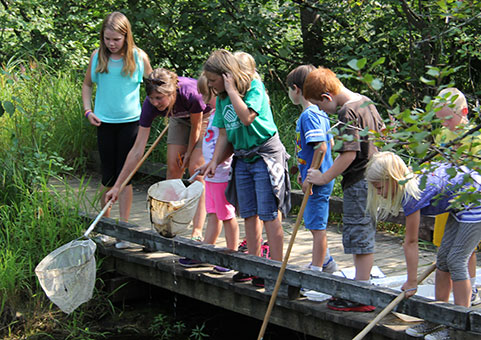
Schmeeckle Graduate Assistantship
The Schmeeckle Reserve Graduate Assistantship provides opportunities to teach and mentor undergraduate students and to learn more about managing a community natural area while pursuing a Master of Science in Natural Resources with an emphasis in Environmental Education and Interpretation. The assistantship is a 20-hour per week position that runs for two academic years including one summer.
The Graduate Assistantship position is now filled for the 2026-2028 session. The application will reopen starting in December 2027 for a start date of August 2028. Please contact us if you are interested in applying.
Past Schmeeckle Graduate Assistants
If you are considering applying for the graduate assistantship at Schmeeckle Reserve, these profiles of former students offer a sense of the diverse master's thesis topics and post-graduate careers possible with this assistantship.
Griffin Bray: 2022-2024
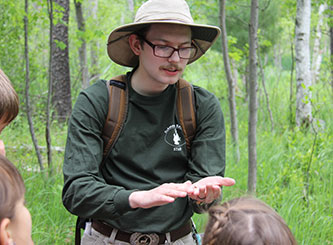 Thesis: Effects of Thematic Interpretive Summery Day Camp Programming on Children's Environmental Attitudes, 2024
Thesis: Effects of Thematic Interpretive Summery Day Camp Programming on Children's Environmental Attitudes, 2024
Then: As part of his thesis, Griffin developed thematic two-week day camp programs for 3rd through 6th graders at Schmeeckle during the summer of 2023. His research evaluated the effects of the program on the participants' environmental attitudes, along with specific elements that were particularly impactful.
Now: After graduating, Griffin took a position with University of Minnesota Extension as a regional extension educator with the Minnesota Master Naturalist program. Based out of Saint Cloud, Minnesota, he works with other Extension educators to maintain and revise Master Naturalist curricula, support program instructors, teach Master Naturalist courses, and plan advanced training opportunities for Master Naturalist volunteers.
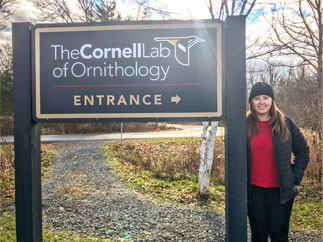
Stephanie Somerville: 2020-2022
Thesis:
Successes and Challenges of Citizen Science at Nature Centers, 2022
Then: Stephanie’s master's thesis investigated the relationship between nature centers and citizen science programs, focusing on the factors that make nature center citizen science programs successful.
Now: After graduating, Stephanie accepted a job with the Cornell Lab of Ornithology in Ithica, New York, where she works as a project assistant with the K-12 Education team within the Center for Engagement in Science and Nature. She supports the team in outreach and communication to educators through social media, eNews, websites, marketing, curriculum development, and professional development initiatives.
Emma Phifer: 2017-2019
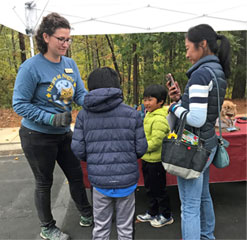 Thesis: Formative Evaluation of Heritage Interpretation Career Recruitment Media Targeting Teenagers, 2019
Thesis: Formative Evaluation of Heritage Interpretation Career Recruitment Media Targeting Teenagers, 2019
Then: Emma's master's thesis focused on designing and evaluating media that could be used to recruit teenagers into a career in Heritage Interpretation. The results are being used by the National Association for Interpretation (NAI) to develop a recruitment toolkit for this age group.
Now: After graduating, Emma worked as an environmental educator and heritage interpreter at the Reedy Creek Nature Center and Preserve in Charlotte, NC, part of the Mecklenburg County Park and Recreation department. She used her skills to revamp the nature center's homeschool program and coordinate several camps. After the COVID-19 pandemic restricted in-person programs, Emma developed temporary garden signage, worked with the county's graphic designer to update historical signs, and created a video about beekeeping and swarms.
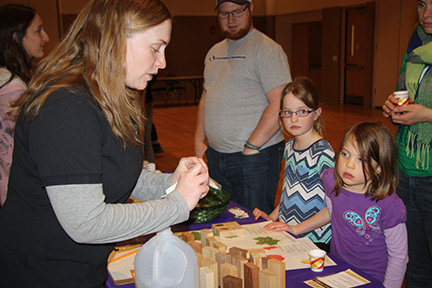
Melissa Ruether: 2015-2017
Thesis:
Development, Implementation, and Evaluation of Intergenerational Nature-based Programs at Schmeeckle Reserve, 2017
Then: Melissa’s master's thesis focused on discovering the best ways to engage intergenerational groups during nature-based programs to later influence greater participation in outdoor activities.
Now: After graduating, Melissa stayed on at UW-Stevens Point to become the school-to-home energy educator with the Wisconsin K-12 Energy Education Program. Melissa worked to improve student and community home energy efficiency through in-class presentations and local events using hands-on tools and activities. She also helped coordinate campus-based and local events, worked with partners such as STEMhero to bring inquiry-based experiences to students, and assisted Green & Healthy Schools Wisconsin to promote the Cool Choices game in classrooms. In 2022, she became Schmeeckle Reserve's outreach coordinator.
Carly Swatek: 2013-2015
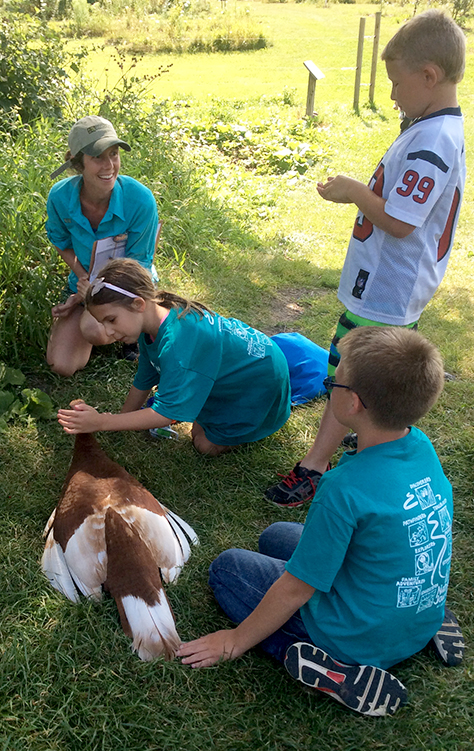 Thesis:
A Community Needs Assessment to Explore the Feasibility of Expanding Environmental Education Programming, 2015
Thesis:
A Community Needs Assessment to Explore the Feasibility of Expanding Environmental Education Programming, 2015
Then: Carly's master's thesis focused on conducting a community needs assessment for expanding environmental education programming at the Reserve. The results of her work will be used in the future to inform unique areas in the Stevens Point community education programs that Schmeeckle Reserve may fill.
Now: After graduating from UWSP, Carly worked at Riveredge Nature Center in Saukville, WI focusing on educational technology and evaluation which stairstepped to eventually becoming the Associate Director and then Director of Education. She then went on to become the Director of Wehr Nature Center in Franklin, WI and is practicing new skills while staying connected to her roots at Schmeeckle through various sign, design, and development avenues that all involve the core principles of interpretation.
Megan Espe: 2011-2013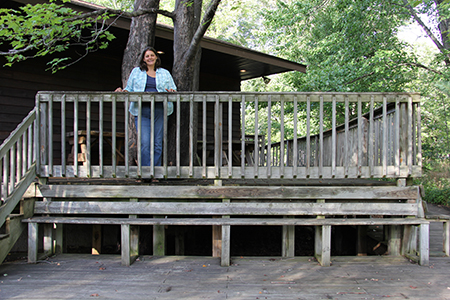
Thesis:
An Exploratory Study of How a Community Involvement Program can Benefit Both Schmeeckle Reserve and Potential Participants, 2013
Then: Megan's master's thesis focused on the development of a community involvement program, such as a friends group, to support Schmeeckle Reserve.
Now: After graduating, Megan stayed on at Schmeeckle Reserve to serve as the natural area's Outreach Coordinator. She organized the
Friends of Schmeeckle Reserve, a community nonprofit that provides support for Schmeeckle. She also assisted with interpretive consulting projects that help support the Reserve, coordinated educational events, taught undergraduate interpretation courses, and organized volunteer efforts. Megan moved to the Wisconsin Forestry Center in 2021 where she served as the Outreach Education and Communications Program Manager and Associate Director. She is currently a Project Manager with NatureServe, a nonprofit organization that provides wildlife conservation-related data, tools, and services to organizations and agencies.
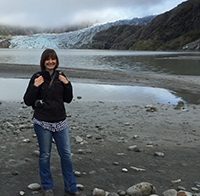 Elise Wahl: 2009-2011
Elise Wahl: 2009-2011
Thesis:
The Design and Formative Evaluation of "The Wisconsin Conservation Success Stories" Documentary in the Wisconsin Conservation Hall of Fame Museum, 2011
Then: Elise's thesis focused on the development of a video exhibit that tied together the stories of inductees in the
Wisconsin Conservation Hall of Fame, located in the Schmeeckle Reserve Visitor Center.
Now: Since graduating from UWSP, Elise has worked as an interpretation and education specialist at Spring Mountains National Recreation Area in Nevada and a program manager for the Blue Ridge Parkway Foundation’s Kids in Parks Program in North Carolina. In 2014, Elise created her own business called
Timberdoodle Studio in Forest Grove, Oregon, where she now works full-time on interpretive media projects across the country.
Ginamaria Smith: 2007-2009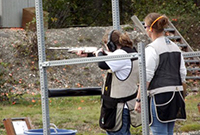
Thesis: An Evaluation of the Wisconsin Conservation Hall of Fame Exhibit Effectiveness and Exploration of Delivery Methods and Learning Modalities, 2009
Then: Gina’s master's thesis focused on studying the impacts of multi-modal exhibits for interpreting the stories and lives of
Wisconsin Conservation Hall of Fame inductees.
Now: After graduating, Gina became a publications specialist for Alaska State Parks designing interpretive media and then the Alaska Department of Fish & Game (ADF&G) laying out the sport fish regulations. Currently Gina is the program coordinator for the ADF&G Hunter Information & Training Program. Gina oversees statewide staff and coordinates more than 400 volunteer instructors to provide hunter education, bowhunter education, muzzleloader education and multiple outdoor programs designed to recruit and retain new hunters into shooting sports and preserve our hunter heritage. She gets to teach youth and women outdoor skills through youth shotgun leagues, National Archery in the Schools Program, and the Becoming an Outdoors Woman (BOW) Program. Gina also volunteers by giving educational presentations for local groups and schools with a live great-horned owl that is in her care.
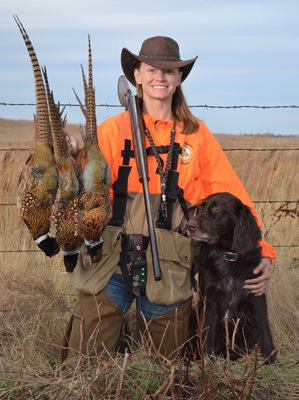 Cortney Schaefer: 2005-2007
Cortney Schaefer: 2005-2007
Thesis:
Development of a Community Education Plan for Urban White-Tailed Deer Management, 2007
Then: Cortney’s master’s thesis focused on creating a community education program for urban white-tailed deer management in Stevens Point, Wisconsin. The study included determining attitudes and opinions of community residents regarding the deer population, evaluating communication modes to reach the community, and developing a community education plan to teach residents about deer population management. The communication strategies and materials she developed have been used by wildlife biologists working with Wisconsin municipalities to implement often-controversial urban deer management efforts.
Now: After graduating, Cortney became a wildlife biologist with the Wisconsin Department of Natural Resources. She managed public and private lands to enhance wildlife populations, provided educational programs to the public, and was very involved with the statewide hunter recruitment/retention program. In 2015, she moved back to her home state of Nebraska and works as the Hunting Heritage Program Manager for Pheasants Forever, advancing a national initiative to recruit and retain hunters.
Nelli (Atkinson) Williams: 2003-2005
Thesis:
Development of a Conservation Education and Interpretation Guidebook for the Thorne Bay and Craig Ranger Districts, Tongass National Forest, 2005
Then: Nelli’s master's thesis focused on developing a comprehensive education and interpretation strategy for the Thorne Bay Ranger District on the Tongass National Forest that included an audience needs assessment, collaboration with community organizations, doing a resource inventory, and creating a guidebook to assist adopting similar programs elsewhere.
Now: After graduating, Nelli worked for two small nonprofits in Oregon, first coordinating events, engaging community members in local natural resource issues, designing outreach materials, and teaching students how to grow their own food, and then moving on to grant-writing and managing volunteers. She also taught graphic design at a local community college. Since 2007, she has worked for Trout Unlimited, an organization dedicated to ensuring that fishing remains good in rivers around the country. Currently, Nelli is Trout Unlimited’s Alaska Program Director and is based in Anchorage. In this role her responsibilities include: guiding efforts to protect critical trout and salmon habitat, helping plan and organize the Bristol Bay Fly Fishing & Guide Academy, fundraising, and growing the base of Alaskans who are inspired and engaged in issues that affect trout and salmon.
